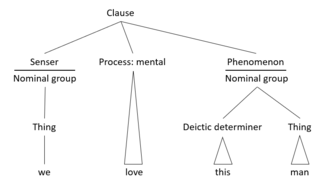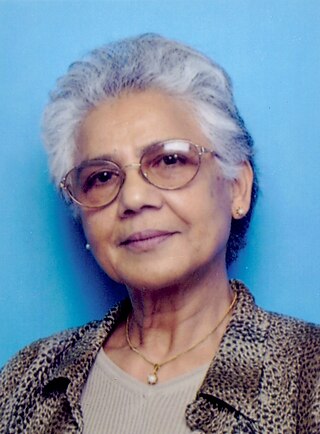Related Research Articles

Functional linguistics is an approach to the study of language characterized by taking systematically into account the speaker's and the hearer's side, and the communicative needs of the speaker and of the given language community. Linguistic functionalism spawned in the 1920s to 1930s from Ferdinand de Saussure's systematic structuralist approach to language (1916).

A metaphor is a figure of speech that, for rhetorical effect, directly refers to one thing by mentioning another. It may provide clarity or identify hidden similarities between two different ideas. Metaphors are usually meant to create a likeness or an analogy.

Michael Alexander Kirkwood Halliday was a British linguist who developed the internationally influential systemic functional linguistics (SFL) model of language. His grammatical descriptions go by the name of systemic functional grammar. Halliday described language as a semiotic system, "not in the sense of a system of signs, but a systemic resource for meaning". For Halliday, language was a "meaning potential"; by extension, he defined linguistics as the study of "how people exchange meanings by 'languaging'". Halliday described himself as a generalist, meaning that he tried "to look at language from every possible vantage point", and has described his work as "wander[ing] the highways and byways of language". But he said that "to the extent that I favoured any one angle, it was the social: language as the creature and creator of human society".

Systemic functional grammar (SFG) is a form of grammatical description originated by Michael Halliday. It is part of a social semiotic approach to language called systemic functional linguistics. In these two terms, systemic refers to the view of language as "a network of systems, or interrelated sets of options for making meaning"; functional refers to Halliday's view that language is as it is because of what it has evolved to do. Thus, what he refers to as the multidimensional architecture of language "reflects the multidimensional nature of human experience and interpersonal relations."
In linguistics and related fields, pragmatics is the study of how context contributes to meaning. The field of study evaluates how human language is utilized in social interactions, as well as the relationship between the interpreter and the interpreted. Linguists who specialize in pragmatics are called pragmaticians. The field has been represented since 1986 by the International Pragmatics Association (IPrA).
Literal and figurative language is a distinction that exists in all natural languages; it is studied within certain areas of language analysis, in particular stylistics, rhetoric, and semantics.
Stylistics, a branch of applied linguistics, is the study and interpretation of texts of all types, but particularly literary texts, and/or spoken language in regard to their linguistic and tonal style, where style is the particular variety of language used by different individuals and/or in different situations or settings. For example, the vernacular, or everyday language may be used among casual friends, whereas more formal language, with respect to grammar, pronunciation or accent, and lexicon or choice of words, is often used in a cover letter and résumé and while speaking during a job interview.
In logic and linguistics, a metalanguage is a language used to describe another language, often called the object language. Expressions in a metalanguage are often distinguished from those in the object language by the use of italics, quotation marks, or writing on a separate line. The structure of sentences and phrases in a metalanguage can be described by a metasyntax. For example, to say that the word "noun" can be used as a noun in a sentence, one could write "noun" is a <noun>.
In linguistics, the topic, or theme, of a sentence is what is being talked about, and the comment is what is being said about the topic. This division into old vs. new content is called information structure. It is generally agreed that clauses are divided into topic vs. comment, but in certain cases the boundary between them depends on which specific grammatical theory is being used to analyze the sentence.

Genre studies is an academic subject which studies genre theory as a branch of general critical theory in several different fields, including art, literature, linguistics, rhetoric and composition studies.
In sociolinguistics, a register is a variety of language used for a particular purpose or particular communicative situation. For example, when speaking officially or in a public setting, an English speaker may be more likely to follow prescriptive norms for formal usage than in a casual setting, for example, by pronouncing words ending in -ing with a velar nasal instead of an alveolar nasal, choosing words that are considered more formal, such as father vs. dad or child vs. kid, and refraining from using words considered nonstandard, such as ain't and y'all.
Text linguistics is a branch of linguistics that deals with texts as communication systems. Its original aims lay in uncovering and describing text grammars. The application of text linguistics has, however, evolved from this approach to a point in which text is viewed in much broader terms that go beyond a mere extension of traditional grammar towards an entire text. Text linguistics takes into account the form of a text, but also its setting, i. e. the way in which it is situated in an interactional, communicative context. Both the author of a text as well as its addressee are taken into consideration in their respective roles in the specific communicative context. In general it is an application of discourse analysis at the much broader level of text, rather than just a sentence or word.

Systemic functional linguistics (SFL) is an approach to linguistics, among functional linguistics, that considers language as a social semiotic system.
Ecolinguistics, or ecological linguistics, emerged in the 1990s as a new paradigm of linguistic research, widening sociolinguistics to take into account not only the social context in which language is embedded, but also the wider ecological context, including other species and the physical environment.
In analytic philosophy, philosophy of language investigates the nature of language and the relations between language, language users, and the world. Investigations may include inquiry into the nature of meaning, intentionality, reference, the constitution of sentences, concepts, learning, and thought.
Social semiotics is a branch of the field of semiotics which investigates human signifying practices in specific social and cultural circumstances, and which tries to explain meaning-making as a social practice. Semiotics, as originally defined by Ferdinand de Saussure, is "the science of the life of signs in society". Social semiotics expands on Saussure's founding insights by exploring the implications of the fact that the "codes" of language and communication are formed by social processes. The crucial implication here is that meanings and semiotic systems are shaped by relations of power, and that as power shifts in society, our languages and other systems of socially accepted meanings can and do change.
Linguistics is the scientific study of language. Linguistics is based on a theoretical as well as a descriptive study of language and is also interlinked with the applied fields of language studies and language learning, which entails the study of specific languages. Before the 20th century, linguistics evolved in conjunction with literary study and did not employ scientific methods. Modern-day linguistics is considered a science because it entails a comprehensive, systematic, objective, and precise analysis of all aspects of language – i.e., the cognitive, the social, the cultural, the psychological, the environmental, the biological, the literary, the grammatical, the paleographical, and the structural.

Ruqaiya Hasan was a professor of linguistics who held visiting positions and taught at various universities in England. Her last appointment was at Macquarie University in Sydney, from which she retired as emeritus professor in 1994. Throughout her career she researched and published widely in the areas of verbal art, culture, context and text, text and texture, lexicogrammar and semantic variation. The latter involved the devising of extensive semantic system networks for the analysis of meaning in naturally occurring dialogues.

James Robert Martin is a Canadian linguist. He is Professor of Linguistics at The University of Sydney. He is the leading figure in the 'Sydney School' of systemic functional linguistics. Martin is well known for his work on discourse analysis, genre, appraisal, multimodality and educational linguistics.
The term metafunction originates in systemic functional linguistics and is considered to be a property of all languages. Systemic functional linguistics is functional and semantic rather than formal and syntactic in its orientation. As a functional linguistic theory, it claims that both the emergence of grammar and the particular forms that grammars take should be explained "in terms of the functions that language evolved to serve". While languages vary in how and what they do, and what humans do with them in the contexts of human cultural practice, all languages are considered to be shaped and organised in relation to three functions, or metafunctions. Michael Halliday, the founder of systemic functional linguistics, calls these three functions the ideational, interpersonal, and textual. The ideational function is further divided into the experiential and logical.
References
- ↑ Halliday, Michael Alexander Kirkwood (1985). Spoken and written language. Oxford: Oxford University Press, p. 12
- ↑ Cuddon, J. A. (1998) "Tenor and vehicle". In: A Dictionary of Literary Terms and Literary Theory. Oxford & Malden, MA: Blackwell, fourth edition, p. 904
- ↑ Danesi, Marcel (1993) Vico, metaphor, and the origin of language. Bloomington, IN: Indiana University Press, p. 126